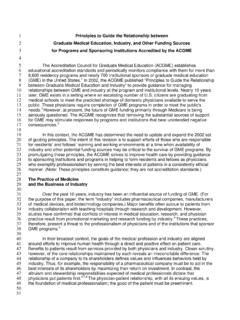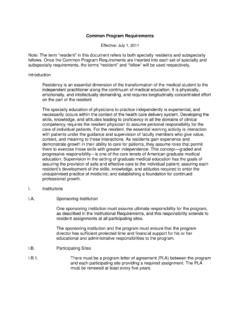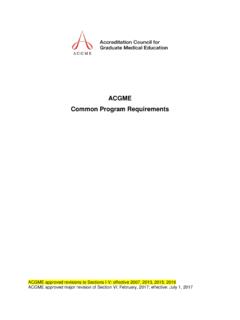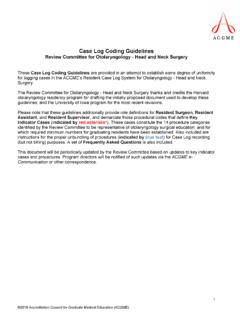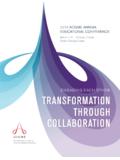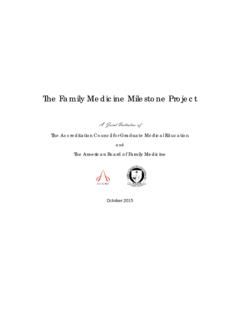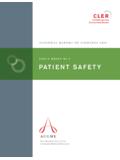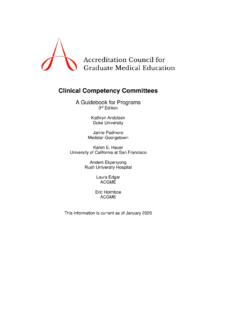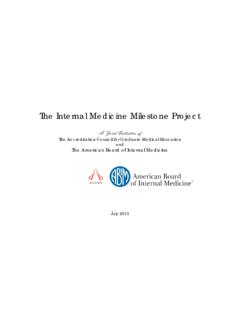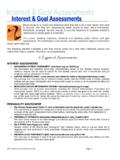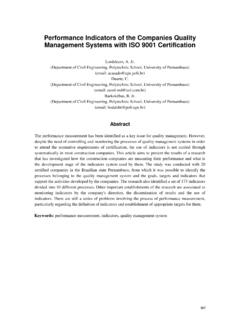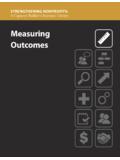Transcription of A Joint Initiative of - ACGME
1 July 2015 The Psychiatry Milestone Project A Joint Initiative of The Accreditation Council for Graduate Medical Education and The American Board of Psychiatry and Neurology i The Psychiatry Milestone Project The Milestones are designed only for use in evaluation of resident physicians in the context of their participation in ACGME -accredited residency or fellowship programs. The Milestones provide a framework for the assessment of the development of the resident physician in key dimensions of the elements of physician competency in a specialty or subspecialty. They neither represent the entirety of the dimensions of the six domains of physician competency, nor are they designed to be relevant in any other context.
2 Ii Psychiatry Milestone Group Christopher R. Thomas MD, Chair Working Group Advisory Group Sheldon Benjamin, MD Timothy Brigham, MDiv, PhD Adrienne L. Bentman, MD Carol A. Bernstein, MD Robert Boland , MD Beth Ann Brooks, MD Deborah S. Cowley, MD Larry R. Faulkner, MD Jeffrey Hunt, MD, MS Deborah Hales, MD George A. Keepers, MD Victor I. Reus, MD Louise King, MS Richard F. Summers, MD Gail H. Manos, MD Donald E. Rosen, MD Kathy M. Sanders, MD Mark E. Servis, MD Kallie Shaw, MD Susan Swing, PhD Alik Widge, MD, PhD iii Milestone Reporting This document presents milestones designed for programs to use in semi-annual review of resident performance and reporting to the ACGME .
3 Milestones are knowledge, skills, attitudes, and other attributes for each of the ACGME competencies organized in a developmental framework from less to more advanced. They are descriptors and targets for resident performance as a resident progresses from entry into residency through graduation. In the initial years of implementation, the Review Committee will examine aggregate milestone performance data for each program s residents as one element in the Next Accreditation System to determine whether residents overall are progressing. Thus, aggregate resident performance will be an additional measure of a program s ability to educate its residents. Program directors have the responsibility of ensuring that residents progress on all 22 psychiatry subcompetencies (as identified in the top row of each milestone table) is documented every six months through the Clinical Competency Committee (CCC) review process.
4 The CCC s decisions should be guided by information gathered through formal and informal assessments of residents during the prior six-month period. The ACGME does not expect formal, written evaluations of all milestones (each numbered item within a subcompetency table) every six months. For example, formal evaluations, documented observed encounters in inpatient and outpatient settings, and multisource evaluation should focus on those subcompetencies and milestones that are central to the resident s development during that time period. Progress through the Milestones will vary from resident to resident, depending on a variety of factors, including prior experience, education, and capacity to learn. Residents learn and demonstrate some skills in episodic or concentrated time periods ( , formal presentations, participation in quality improvement project, child/adolescent rotation scheduling, etc.)
5 Milestones relevant to these activities can be evaluated at those times. The ACGME does not expect that resident progress will be linear in all areas or that programs organize their curricula to correspond year by year to the Psychiatry Milestones. All milestone threads (as indicated by the letter in each milestone reference number, the A in PC1, ) should be formally evaluated and discussed by the CCC on at least two occasions during a resident s educational program. Thread names, preceded by their indicator letters, are listed in the top row of each milestone table. Each thread describes a type of activity, behavior, skill, or knowledge, and typically consists of two-to-four milestones at different levels. For example, the B thread for PC1, named collateral information gathering and use, consists of the set of progressively more advanced and comprehensive behaviors identified as , , , , and ,B.
6 The thread identifies the unit of observation and evaluation. For, PC1, thread B, faculty members would observe a resident s evaluation of a patient to see whether he or she demonstrates the iv collateral information gathering and use behaviors described in that milestone. Threads do not always have milestones at each level 1-5; some threads may consist of only one milestone (see the diagram on page vi). For each six-month reporting period, review and reporting will involve selecting the level of milestones that best describes a resident s current performance level. Milestones are arranged into numbered levels. These levels do not correspond with post-graduate year of education. Selection of a level for a subcompetency implies that the resident substantially demonstrates the milestones in that level, as well as those in lower levels (see the diagram on page vi).
7 A general interpretation of levels for psychiatry is below: Has not Achieved Level 1: The resident does not demonstrate the milestones expected of an incoming resident. Level 1: The resident demonstrates milestones expected of an incoming resident. Level 2: The resident is advancing and demonstrates additional milestones, but is not yet performing at a mid-residency level. Level 3: The resident continues to advance and demonstrate additional milestones; the resident demonstrates the majority of milestones targeted for residency in this sub-competency. Level 4: The resident has advanced so that he or she now substantially demonstrates the milestones targeted for residency. This level is designed as the graduation target.* Level 5: The resident has advanced beyond performance targets set for residency and is demonstrating aspirational goals which might describe the performance of someone who has been in practice for several years.
8 It is expected that only a few exceptional residents will reach this level. *Level 4 is designed as the graduation target and does not represent a graduation requirement. Making decisions about readiness for graduation is the purview of the residency program (See the Milestones FAQ for further discussion of this issue: Can a resident/fellow graduate if he or she does not reach every milestone? ). Study of Milestone performance data will be required before the ACGME and its partners will be able to determine whether Level 4 milestones and milestones in lower levels are in the appropriate level within the developmental framework, and whether Milestone data are of sufficient quality to be used for high stakes decisions. v Selecting the Appropriate Milestone Level for your Residents: The Role of Supervision Faculty supervisors, especially those overseeing clinical care, will directly assess many milestones.
9 The CCC assessment is based on evaluations completed by these clinical supervisors along with other assessments, including performance on tests and evaluations from other sources. The process of Milestone assignment assumes that all residents are supervised in their clinical work, as outlined in the ACGME s supervision levels and requirements. For the purposes of evaluating a resident s progress in achieving Patient Care and Medical Knowledge Milestones, though, it is important that the evaluator(s) determine what the resident knows and can do, separate from the skills and knowledge of his or her supervisor. Implicit in milestone level evaluation of Patient Care (PC) and Medical Knowledge (MK) is the assumption that during the normal course of patient care activities and supervision, the evaluating faculty member and resident participate in a clinical discussion of the patient's care.
10 During these reviews the resident should be prompted to present his or her clinical thinking and decisions regarding the patient. This may include evidence for a prioritized differential diagnosis, a diagnostic workup, or initiation, maintenance, or modification of the treatment plan, etc. In offering his or her independent ideas, the resident demonstrates his or her capacity for clinical reasoning and its application to patient care in real-time. As residents progress, their knowledge and skills should grow, allowing them to assume more responsibility and handle cases of greater complexity. They are afforded greater autonomy - within the bounds of the ACGME supervisory guidelines - in caring for patients. At Levels 1 and 2 of the Milestones, a resident's knowledge and independent clinical reasoning will meet the needs of patients with lower acuity, complexity, and level of risk, whereas, at Level 4, residents are expected to independently demonstrate knowledge and reasoning skills in caring for patients of higher acuity, complexity, and risk.
